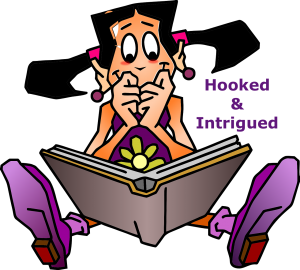I stopped reading “The Chain of Awesomeness” by Jeff Somers (Writer’s Digest July/August 2016). I brought up my first chapter to see if my opening line held the mystery Somers said was more important than shock or coolness (even though they’re good too).
My opening line contained some mystery. The reader might ask why my character was doing what she did. But I continued to read my chapter. Bong! There lay the sentence that had the mystery and the coolness.
And, I received a bonus. The second line of my new opening paragraph accomplished what Somers said the rest of the first paragraph should do:
“Offer a small amount of satisfaction for the reader who’s just been hooked by your awesome first line, then build on that intrigue.”
First Lines – No Mystery
- The sun was out full force.
- I live in California.
- My name is Dawn.
These first lines don’t prompt the reader to ask a question.
Better Rewrites:
- For the first time in a year, Hector saw the sun, and it was out in full force. (Why hadn’t Hector seen the sun in a year?)
- Due to an accident, I live in California. (What accident caused the protagonist to live in California?)
- Because of what happened at the first appearance of light on the day I was born, my name is Dawn. (What happened at the first appearance of light? Did the event have something to do with Dawn, the mother, or the town?)
First Lines With Mystery
For fun, I grabbed books from my shelves written before or at the turn of the twentieth century. It seems, even though the writing is different, the authors realized they needed to hook the reader with a mystery. You can see if they provoke a question for you.
- “‘Mamma, what was that I heard papa saying to you this morning about his lawsuit?’” (Wide, Wide World by Elizabeth Wetherell)
- What lawsuit was brought against the child’s father?
- “‘Shall I ever be strong in mind or body again?’ said Walter Gregory with irritation as he left the sidewalk and crowded into a Broadway omnibus.” (Opening a Chestnut Burr by Rev. E. P. Roe)
- What happened that Walter became weak in mind and body?
- “It was a beautiful morning in the late July when I set forth on foot for the last time for Aros.” (The Merry Men by Robert Louis Stevenson)
- Why was he going to Aros, and why was it the last time?)
- “‘And so, dear old thing, I really can’t come.’” (The Marriage of Barry Wicklow by Ruby M. Ayres)
- Why couldn’t the speaker come?
- “In an upper chamber, through the closed blinds of which the sun is vainly striving to enter, Reginald Branscombe, fifth Earl of Sartoris, lies dead.” (Faith and Unfaith by The Duchess)
- How did the Earl die and why is his death important?
Make sure your opening line raises a question for your readers. Click to tweet.
What’s the question you asked in the opening line of the book you’re currently reading?





 RSS - Posts
RSS - Posts



“Excellent advice, Zoe! Once again, it is the familiar bit of wisdom, so easily forgotten or overlooked, that finally un-gnarls a tangled thread.”
(What stellar advice did Zoe offer, and what gnarly situation did that advice smooth out for the author?) Wouldn’t you like to know! 😀
Loved the examples!
Hi Delia. I’m learning more and more that it’s many simple things that can improve my manuscript, especially after I’ve done the hard work of getting the story down on Scrivener.
Great information, especially to a new writer like me. Thank you. 🙂
Thanks, Melissa, and welcome to the world of writing.
This is so timely, Zoey. I was just reviewing my opening line. It’s dialogue, and my main character is asking a question. It fits the checklist of guidelines. I enjoyed the blog. Thank you so much. Cheers
Hi Marilyn, I know those old novels opened often with dialogue, but I wasn’t so sure if today’s authors do it that much, so I looked at twenty current books on my shelves and 1 out of 20 opened with dialogue. I then looked at a few blogs on the issue. A couple said it’s hard to make dialogue work for the reader because the reader knows nothing about the character and has no context. One said if you use a dialogue opener, it’s best to use just one line. The one out of twenty that opened with dialogue used one short line. One person said it depends. If it works, why not. I did notice that a couple of books I looked at had a short sentence and then a sentence of dialogue. I didn’t mean to lead anyone astray by using the old novels. Use your good judgment. Anyone else here have thoughts on opening with dialogue?
I’ve had fun looking for the mystery in the opening line.
All Things New by Lynn Austin: Josephine Weatherly thought she’d already lived through the darkest hour of this endless war, but she had been wrong.
Imperfect by Christy Barritt: I remember the day that darkness slithered into my home.
One More Lie by James Scott Bell: “I’m divorcing her,” Brian said.
The Heart Reader by Terri Blackstock: The dream came on Sunday night, after an afternoon of golf and an evening of watching politicians debate on cable.
Parrish the Thought by Catherine Leggitt: A man in the Woman’s restroom?
OK, do want to know what is worse than a war’s darkest hour, what slithered, why Brian wants to divorce, what was in a dream more than why a man was in the woman’s restroom?
Good for you, Marcia, looking for the mystery in opening lines in current novels. I note one starts with dialogue, speaking to our previous discussion above. Thanks for sharing them with us, Marcia.